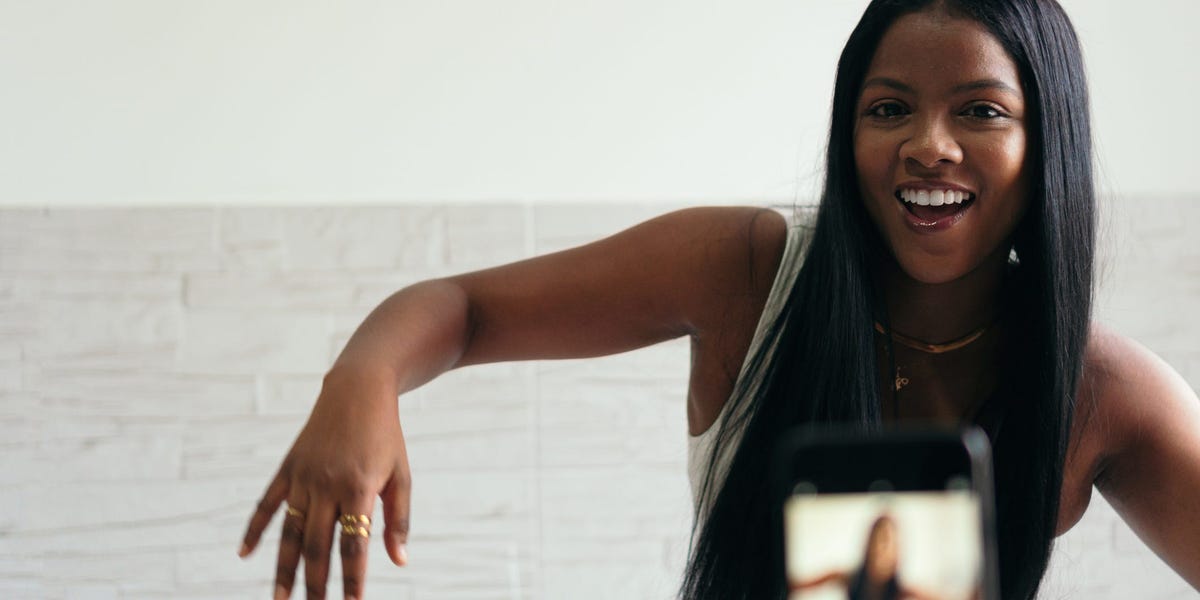Black content creators were monumental in helping make TikTok into what it is today, but now they might be some of the most affected if the platform is banned in the US.
The US Senate passed a bill last week that could mean TikTok is removed from app stores in nine months unless its parent company, Bytedance, sells it to a US corporation.
Soon after, President Joe Biden signed it into law, meaning the clock is now ticking for ByteDance to give up its US TikTok assets or face a nationwide ban.
Black creators who spoke with Business Insider said they feel they will be particularly affected if the ban goes ahead despite playing such a huge part in helping TikTok become what it is today.
Their support for TikTok is complicated. They say the app has historically been inconsistent with crediting Black creators and having faced allegations of “toxicity and racism” inside the company.
But largely, TikTok is a place Black creators found where they could thrive and reach new audiences and customers for their growing businesses.
Overall, a TikTok ban would be “devastating” to Black creators, Tenyse Williams, the CEO and founder of Verified Consulting and an adjunct instructor at the University of Central Florida, Columbia University, and George Washington University, told BI.
“They have worked hard to build their followers and businesses on this platform, and losing it would mean starting over from scratch,” she said. “It’s not just a matter of losing a platform, but also rebuilding their digital homes and communities.”
The democratization of influencing
Funmi Ford, a creator with 242,000 followers, told BI she saw many Black creators grow on TikTok when it boomed during the start of the pandemic.
“I remember that phrase, ‘the democratization of influencing,’ because, on Instagram, there weren’t a lot of Black creators that had even hit a million followers,” Ford said. “They got on TikTok, these same creators, with these same ideas and the same passion, and all of a sudden they’re hitting millions of views, a million plus followers.”
It wasn’t that the content wasn’t good, Ford said, it was that Instagram “just wasn’t a place for Black creators, minority creators, to excel.” On TikTok, in comparison, they “grew like crazy,” she said.
Now, 19% of TikTok users in the US are Black, according to a 2023 survey by Pew Research Center, which is higher than the group’s representation in the adult population (12%). In the same report, while 10% of white teens said they used TikTok almost constantly, 20% of Black teens did.
Nya Étienne, a creator and journalist, told BI she turned to TikTok when she didn’t feel heard in the traditional media space.
There, she was able to express herself and find her audience, she said. Rebuilding her 26,000 followers elsewhere, she said, would be a challenge.
“With the looming TikTok ban, I’ve been trying to convert to Instagram, and it’s going OK, but it’s nothing like what I have on TikTok,” Étienne said. “TikTok is such a unique space for us, and it’s sad that it could be taken away.”
Black-owned businesses thrive with TikTok
An Oxford Economics report published in March found that 57% of small and medium Black-owned business owners said TikTok is “critical to their business’s existence,” with 83% saying they had seen their sales increase after promoting their products there.
Ford said TikTok is full of mom and pop shops that have been “struggling for years” that finally found a new audience and are now thriving. There are also popular influencers, such as Keith Lee, who highlight Black-owned small businesses and restaurants.
Black creators were also instrumental in pushing momentum on TikTok from a dance app to one full of conversations, entrepreneurialism, and personal stories, Ford said.
“Black creators just did a lot to help the app be what it is,” she said.
Kahlil Dumas, a TikTok creator with 29,000 followers who is the founder of Free the CEO and the host of the podcast “UNSTUCKKD,” told BI that if TikTok disappears, Black creators “risk losing the communities they’ve built.”
“They would need to cultivate communities on other platforms while trying to transfer their TikTok community,” he said.
It may not be easy to regrow their followings elsewhere, Dumas added, which could lead to fewer brand deals, less ad revenue, and less income overall.
A complicated relationship
Black creators have a somewhat strained relationship with TikTok. Though the app has made efforts to promote Black-owned businesses with movements such as #BlackBusinessMonth and #SupportBlack in the past few years, Black creators have expressed frustrations with censorship and inequality on the platform.
Some Black creators suspected their Black Lives Matter content was suppressed in 2020 after George Floyd’s death ignited a wave of protests.
Black TikTokers have also expressed an “undertone of anti-Blackness” in the platform’s algorithm, where white creators benefited from the trends started by Black creators.
In February 2020, for example, The New York Times reported that the mega-popular “Renegade” dance on TikTok had been created by Jalaiah Harmon, a Black teenager from Atlanta, but everyone on the app seemed to attribute it to white TikTokers like Charli D’Amelio. White creators were also invited onto talk shows to demonstrate dances that Black TikTokers came up with.
A TikTok spokesperson told BI at the time that Black creators are “a critical and vibrant part” of the experience on the app. “We care deeply about the experience of Black creators on our platform and we continue to work every day to create a supportive environment for our community while also instilling a culture where honoring and crediting creators for their creative contributions is the norm,” they said.
Studies have also shown Black creators make less money than their white counterparts, and it has taken longer for prominent Black creators (including Khaby Lame, the biggest creator on the platform with 162 million followers) to feature on Forbes’ list of top-earning talent.
This is disheartening, Black creators told BI, because so many top trends and ideas come from their community.
Williams told BI TikTok’s vibrancy and inclusivity of so many different cultures is thanks to the “exceptional ingenuity, authenticity, and trend-setting capacities of Black creators.”
“They are pioneers in carving the platform’s soul and are the driving force behind its success,” she said. “In essence, they are the beat to TikTok’s heart.”
Étienne told BI that ever since the beginning of TikTok, Black creators “have done copious amounts of hidden labor,” whether it’s creating dances, promoting music, or seeing African-American Vernacular English (AAVE) transform into “internet slang.”
“Seeing our labor either go unseen or become monetized for other creators is, of course, frustrating,” she said. “The barriers of entry to being a successful influencer are so much higher as a Black creator, which is sadly a truth that we have to face online and in real life.”
It’s discouraging for full-time creators to see their work “underrepresented and under-recognized,” Étienne added, which is why some are considering subscription-based platforms such as Substack and Patreon or moving to YouTube, where monetization through AdSense can be more lucrative than TikTok.
“That ownership is very important,” Étienne said. “Especially when platforms can come and go.”
Imani Bashir, who has nearly 100,000 followers, agreed that feelings about a potential TikTok ban are complicated. Black creators just don’t get the same rewards from the app as their white peers, which makes it harder to want to fight for it, she said.
For example, Bashir has applied for certification multiple times and fits all the criteria but has been repeatedly denied.
“We’re still, to this day, being suppressed and being stifled in our content,” she said. “We want to reap the same benefits as other content creators.”
Bashir estimates up to 70% of her current followers wouldn’t move to Instagram or another platform if TikTok is banned, so despite its faults, she wants it to stay.
“We love this app, we want this app, but the love isn’t reciprocated,” Bashir said.
Those in charge should remember, “We are traditionally the ones that organize,” Bashir said. “We are the ones who will fight for it.”
BI has reached out to TikTok for further comment.




